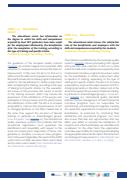ITEM 7.2.3 Educational Center The educational center has information on the degree to which the skills and competences acquired by Dual VET graduates have been useful for the employment obtained by the beneficiaries after the completion of the training, according to the type of training and specific criteria Completely / Enough / Something / Nothing The guidelines of the European quality systems (EQAVET) recommend regular and systematic data collection to measure success and identify areas for improvement. In this case, the aim is to find out to what extent the skills and competences acquired by the Dual Professional Formative programs have been useful for the beneficiaries to obtain employment after completing the training, according to the type of training and specific criteria. For the evaluation and review of the processes and results or results of the training received, which may include the assessment of the satisfaction of the people who participate in the processes and the performance and satisfaction of the staff. The aim is to increase employability, improve the responsiveness of VET to changing demands on the labor market and at the same time support the provision of tailored training, in particular to disadvantaged groups. [one. European. See: EQAVET A6] The international quality assurance systems (ISO) indicate that the educational organization must guarantee the identification and traceability with respect to the study and employment trajectories of those who graduate or complete a course or study program. And to the extent applicable, the result of the staff’s work in terms of what was done; When was it made and by whom was it made? [two. International. See: ISO 21001:2018 – Section 8.5.2.b) c)].ITEM 7.2.4 Educational Center The educational center knows the satisfaction rate of the beneficiaries and employers with the skills and competences acquired by the students. Completely / Enough / Something / Nothing The indications established by the European quality systems (EQAVET) advise proceeding with regular and systematic data collection to find out to what extent the skills and competences acquired by Dual Professional Formative programs have been useful for the beneficiaries to obtain employment after completion of training, depending on the type of training and specific criteria. The aim is to increase employability, improve the responsiveness of VET to changing demands on the labor market and at the same time support the provision of tailored training, in particular to disadvantaged groups [1. European. See: EQAVET A6]. International quality standards indicate that the management of Dual Professional Formative programs must be responsible for determining, understanding and regularly meeting the needs and expectations of students and other beneficiaries, as evidenced by monitoring their satisfaction and educational progress. You must also ensure that risks and opportunities that may affect your ability to increase the satisfaction of students and other beneficiaries are identified and considered. On the other hand, the organization must take responsibility for analyzing and evaluating the appropriate data and information that arise from monitoring and measurement [2. International. See: ISO 21001:2018 – Section 5.1.2. and 9.1.5 a) b)].
